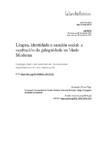Lingua, identidade e sanción social: a ocultación da galeguidade na Idade Moderna

Use este enlace para citar
http://hdl.handle.net/2183/32873
A non ser que se indique outra cousa, a licenza do ítem descríbese como Atribución-NoComercial 4.0 Internacional
Coleccións
- GI-ILLA - Artigos [130]
Metadatos
Mostrar o rexistro completo do ítemTítulo
Lingua, identidade e sanción social: a ocultación da galeguidade na Idade ModernaTítulo(s) alternativo(s)
Language, identity and social sanction: the concealment of galicianness in the early modern periodAutor(es)
Data
2022-07-09Cita bibliográfica
Peres Vigo, A. (2022). Lingua, identidade e sanción social: a ocultación da galeguidade na Idade Moderna. LaborHistórico, 8(2), 173-196. doi:https://doi.org/10.24206/lh.v8i2.51215
Resumo
[Resumo] A ocultación da identidade representa unha estratexia social amplamente documentada entre individuos pertencentes a colectivos estigmatizados e expostos ao maltrato e á sanción social. No caso galego, esta práctica, atribuída a unha parte da diáspora asentada en Castela, foi plasmada −e satirizada− ao longo da produción literaria española, especialmente durante o período aurisecular. Con todo, as referencias verbo
deste fenómeno tamén se deixaron sentir na paremioloxía, así como na propia fraseoloxía do centro e sur peninsular da altura, onde o galego representaba un colectivo nacional cuxo trazo caracterizador máis visíbel foi a lingua. Debido á súa visibilidade, o idioma acabaría por se converter non só nun perigoso delator étnico mais tamén nun elemento que facilitaba a ocultación identitaria mediante a adscrición a outros grupos afíns como o portugués. Porén, este tipo de acollementos estivo supeditado ás diferentes relacións interétnicas ao
abeiro das cambiantes circunstancias políticas. Para alén dos literarios, resultan especialmente significativos os numerosos testemuños que desde o século XVII dotan de verismo esta práctica cuxa vixencia se estendeu até tempos contemporáneos. [Abstract] Identity concealment is a widely documented social strategy among individuals belonging to groups which are stigmatised and exposed to ill-treatment and social sanctions. In the Galician case, this practice attributed to part of the Galician diaspora in Castile was depicted – and satirised – in Spanish literature, particularly during the Golden Age. Nevertheless, references to this phenomenon are also to be found in proverbs and
idioms of the centre and South of the peninsula at the time, when Galicians were a national group whose most visible distinctive feature was their language. Due to this visibility, the Galician language would gradually become a dangerous ethnic mark but also, at the same time, an element enabling identity concealment through the association to related groups, such as the Portuguese. However, these kinds of responses were dependent on the different inter-ethnic relationships under changing political circumstances. Besides the literary records, we find a particularly significant abundance of evidence since the 17th century
pointing to this practice which continued up to the present day.
Palabras chave
Lingua galega
Ocultación da identidade
Galaicofobia
Literatura española
Século XVII.
Galician language
Identity concealment
Gallaecophobia
Spanish literature
17th century
Ocultación da identidade
Galaicofobia
Literatura española
Século XVII.
Galician language
Identity concealment
Gallaecophobia
Spanish literature
17th century
Versión do editor
Dereitos
Atribución-NoComercial 4.0 Internacional
ISSN
2359-6910






